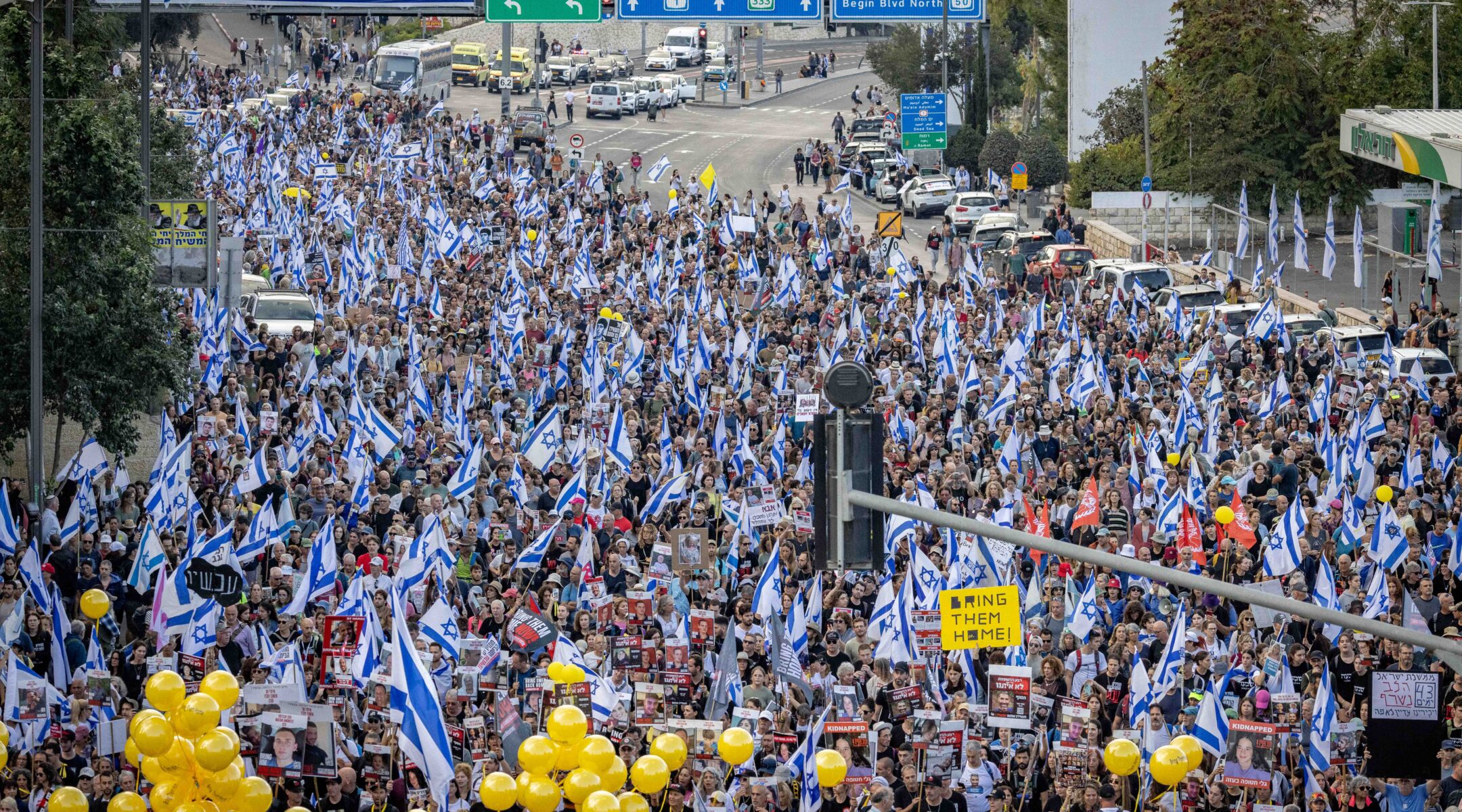(JTA) — Tens of thousands of Israelis joined the families of many of the roughly 240 people held hostage by Hamas since Oct. 7 in a silent protest outside the offices of Prime Minister Benjamin Netanyahu Saturday night.
Later on Saturday, the Washington Post reported a deal for the release of about 50 of the hostages, including the estimated 40 children abducted by the terror group. But both Israeli and U.S. official batted down the report, saying that no deal yet had been reached.
The rally was the culmination of a five-day protest march from Tel Aviv to Jerusalem that aimed to call attention to what the families said was inadequate focus on their loved ones’ plight amid Israel’s war against Hamas in Gaza. Six weeks into the war, and three weeks into a ground invasion, just a handful of hostages have been freed while at least three others have died, leaving the vast majority unaccounted for in a battered Gaza Strip.
Spurred by a group called the Hostage and Missing Families Forum that formed within days of Hamas’ attack, the hostages have become a cause célèbre the world over. In addition to the “Kidnapped” posters that are ubiquitous in many cities, supporters have mounted installations of Shabbat tables, shoes and strollers; “adopted” hostages in their synagogues and schools; and recruited celebrities to call attention to their plight. On Saturday, a boat parade in the canals of Amsterdam amplified the slogan “Bring them home.”
Yet the families have been frustrated at home, where Netanyahu has met only once with a small number of them and where the military’s top goal of dismantling Hamas could put their loved ones at risk inside Gaza. Many have expressed anger at Netanyahu and his government.
“We have a message for the war cabinet — it cannot be that you make a decision without sitting with us and looking us in the eye. Look us in the eye!” Naor Pakciarz, who is representing the families of the hostages from Kibbutz Be’eri, where dozens of people are believed to have been taken, told Times of Israel.
In recent days, the deaths in captivity of three hostages have been announced: a 19-year-old soldier named Noa Marciano, a 65-year-old woman named Yehudit Weiss; and a 22-year-old Tanzanian student named Clemence Matanga. (The families’ march detoured to Marciano’s home in Modiin on Thursday.) No information has been released about the circumstances of their deaths.
Netanyahu and other leaders of his emergency government addressed the hostages at a press conference Saturday night. There was no deal to release them, he said, but reaching a deal that would keep families together was a shared priority within his government. Benny Gantz, a longtime rival of Netanyahu who agreed to work alongside him during the war, took a slightly different stance, according to local reports, saying that gaining the release of the hostages was a more pressing goal than defeating Hamas.
Shortly afterwards came the Washington Post report, which said the United States had brokered a deal for the release of 50 hostages in batches over several days in exchange for a five-day pause in fighting, increased humanitarian aid and the release of some Palestinians being held in Israeli prisons.
The United States said the report was premature. “We have not reached a deal yet, but we continue to work hard to get to a deal,” tweeted the White House National Security Council Spokesperson Adrienne Watson.
JTA has documented Jewish history in real-time for over a century. Keep our journalism strong by joining us in supporting independent, award-winning reporting.






